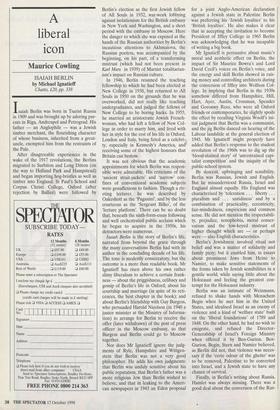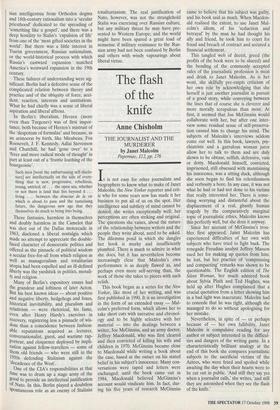A liberal icon
Maurice Cowling
ISAIAH BERLIN by Michael Ignatieff Chatto, £20, pp. 338 Isaiah Berlin was born in Tsarist Russia in 1909 and was brought up by adoring par- ents in Riga, Andreapol and Petrograd. His father — an Anglophile — was a Jewish timber merchant, the flourishing character of whose business, inherited from a great- uncle, exempted him from the restraints of the Pale.
After disagreeable experiences in the wake of the 1917 revolutions, the Berlins migrated to Surbiton and Long Ditton (on the way to Holland Park and Hampstead) and began importing hog-bristles as well as timber into England. St Paul's School and Corpus Christi College, Oxford (after rejection by Balliol) were followed by Berlin's election as the first Jewish fellow of All Souls in 1932, war-work lobbying against isolationism for the British embassy in New York and Washington, and a short period with the embassy in Moscow. Here the danger to which she was exposed at the hands of the Russian authorities by Berlin's incautious attentions to Akhmatova, the Russian poetess, was accompanied by the beginning, on his part, of a transforming mistrust (which had not been present in Karl Marx in 1939) of Marxist totalitarian- ism's impact on Russian culture.
In 1946, Berlin resumed the teaching fellowship to which he had been elected at New College in 1938, but returned to All Souls in 1950 on the grounds that he was overworked, did not really like teaching undergraduates, and judged the fellows of New College to be boring hacks. In 1955, he married an aristocratic Jewish French- woman, who had left a fellow of New Col- lege in order to marry him, and lived with her in style for the rest of his life in Oxford, London and Italy, being feted as a celebri- ty, especially in Kennedy's America, and receiving some of the highest honours that Britain can bestow.
It was not obvious that the academic appointments for which Berlin was respon- sible were admirable. His criticisms of the `ancient strait-jackets' and 'narrow' con- fines of conventional academic subjects were genuflexions to fashion. Though a riv- eting lecturer, he was described by Oakeshott as the Paganinf, and by the less courteous as the 'Sergeant Bilko', of the `lecture platform'. There can be no doubt that, beneath the sixth-form-essay following and well orchestrated public acclaim which he began to acquire in the 1950s, his detractors were numerous.
Isaiah Berlin is the story of Berlin's life, narrated from beyond the grave through the many conversations Berlin had with its author in the concluding decade of his life. The tone is modestly consecratory, but the outcome is a more than readable book. Mr Ignatieff has risen above his own rather slimy liberalism to achieve a certain frank- ness — about the priggishness, celibacy and gossip of Berlin's life in Oxford; about his courtship and marriage (in spite of its reti- cences, the best chapter in the book); and about Berlin's friendship with Guy Burgess, who persuaded Harold Nicolson (in 1940 a junior minister at the Ministry of Informa- tion) to arrange for Berlin to receive the offer (later withdrawn) of the post of press officer in the Moscow embassy, so that Burgess and Berlin could go to Moscow together.
Nor does Mr Ignatieff ignore the judg- ments of Ryle, Hampshire and Wittgen- stein that Berlin was not a very good philosopher. He adds his own judgments: that Berlin was unduly sensitive about his public reputation, that Berlin's father was a more religious Jew than Berlin wished to believe, and that in leaking to the Ameri- can newspapers in 1943 an Eden proposal for a joint Anglo-American declaration against a Jewish state in Palestine Berlin was preferring his 'Jewish loyalties' to his `British loyalties'. He also makes it clear that in accepting the invitation to become President of Iffley College in 1965 Berlin was acknowledging that he was incapable of writing a big book.
Mr Ignatieff is persuasive about music's moral and aesthetic effect on Berlin, the impact of Sir Maurice Bowra's and Lord David Cecil's voices on Berlin's voice, and the energy and skill Berlin showed in rais- ing money and controlling architects during the conversion of Iffley into Wolfson Col- lege. In implying that Berlin in the 1930s somehow differed from Hampshire, Hill, Hart, Ayer, Austin, Crossman, Spender and Goronwy Rees, who were all Oxford friends or contemporaries, he slightly spoils the effect by recalling Virginia Woolf s ini- tial judgment that Berlin was a communist, and the jig Berlin danced on hearing of the Labour landslide at the general election of 1945. Mr Ignatieff might properly have added that Berlin's response to the student revolution of the 1960s was to dig up the `blood-stained story' of 'unrestrained capi- talist competition' and the iniquity of the public-school system.
By descent, upbringing and sensibility, Berlin was Russian, Jewish and English. But he misunderstood Russia, Israel and England almost equally. His England was characterised by 'toleration . . . liberty . . . pluralism and . . . untidiness' and by a combination of practicality, eccentricity, fair-mindedness, empiricism and common sense. He did not mention the respectabili- ty, prejudice, xenophobia, moral conser- vatism and the low-keyed mistrust of higher thought which are — or perhaps were — also English characteristics.
Berlin's Jewishness involved ritual not belief and was a matter of solidarity and family piety; but it enabled him, in essays about prominent Jews from Heine to Namier, to make sensitive statements of the forms taken by Jewish sensibilities in a gentile world, while saying little about the Holocaust and feeling the greatest con- tempt for the Holocaust industry.
Berlin was an intimate of Weizmann, refused to shake hands with Menachem Begin when he met him in the United States, and idealised Israel as an enemy of violence and a kind of 'welfare state' built on the 'liberal foundations' of 1789 and 1848. On the other hand, he had no wish to emigrate, and refused the Director- Generalship of Israel's Foreign Ministry when offered it by Ben-Gurion. Ben- Gurion, Begin, Stern and Namier believed, as Berlin did not, that violence was neces- sary if the 'eerie odour of the ghetto' was to be removed, Palestine to be converted into Israel, and a Jewish state to have any chance of survival.
Finally, in Berlin's writing about Russia, Hamlet was always missing. There was a good deal about the conversion of the Rus- sian intelligentsia from Orthodox dogma and 18th-century rationalism into a 'secular priesthood' dedicated to the spreading of `something like a gospel', and there was a deep hostility to Stalin's 'expulsion of life' from one of the 'most gifted societies in, the world'. But there was a little interest in Tsarist government, Russian nationalism, or the world-historical process with which Russia's eastward expansion matched America's westward expansion in the 19th century.
These failures of understanding were sig- nificant. Berlin had a defective sense of the complicated relation between theory and practice and of the ubiquity of force, acci- dent, reaction, interests and institutions. What he had chiefly was a sense of liberal aspiration and liberal affront.
In Berlin's liberalism, Herzen (more even than Turgenev) was of first impor- tance, both because of Herzen's mistrust of the 'despotism of formulae' and because, as an aristocrat by birth, like Mirabeau, Fox Roosevelt, J. F. Kennedy, Adlai Stevenson and Churchill, he had 'gone over' to a `freer and more radical mode of thought' in part at least out of a 'frantic loathing of the bourgeoisie'.
Such men [went the embarrassing self-disclo- sure] are intellectually on the side of every- thing that is new, progressive, rebellious, young, untried, of . . . the open sea, whether or not there is land that lies beyond it . . . living . . . between the douceur de la vie which is about to pass and the tantalising future, the dangerous new age that they themselves do much to bring into being.
These fantasies, harmless in themselves and doubly harmless in the Camelot that was shot out of the Dallas motorcade in 1963, disclosed a liberal nostalgia which made no attempt to appreciate the double- faced character of democratic politics and offered as the pinnacle of political wisdom a secular free-for-all from which religion as well as managerialism and totalitarian utopia had been expelled and an ill-defined liberty was the yardstick in politics, morali- ty and religion.
Many of Berlin's expository essays had the grandeur and loftiness of later Acton. But his best known ideas — about positive and negative liberty, hedgehogs and foxes, historical inevitability, and pluralism and relativism — were rhetorical, his fame, even after Henry Hardy's exercises in recovery, registering less a pinnacle of wis- dom than a coincidence between fashion- able reputations acquired as lecturer, conversationalist, guest, and wartime rap- porteur, and eloquence deployed by impli- cation against fellow-travellers — some of them old friends — who were still in the 1950s defending Stalinism against the decadence of the West'.
One of the CIA's responsibilities at that tune was to drum up a stage army of the good to provide an intellectual justification of Nato. In this, Berlin played a doubtless spontaneous role as an enemy of Stalinist totalitarianism. The real justification of Nato, however, was not the stranglehold Stalin was exercising over Russian culture, but any military threat he may have pre- sented to Western Europe; and the world might have been spared a great load of nonsense if military resistance to the Rus- sian army had not been confused by Berlin and others with windy vapourings about liberal virtue.











































































 Previous page
Previous page